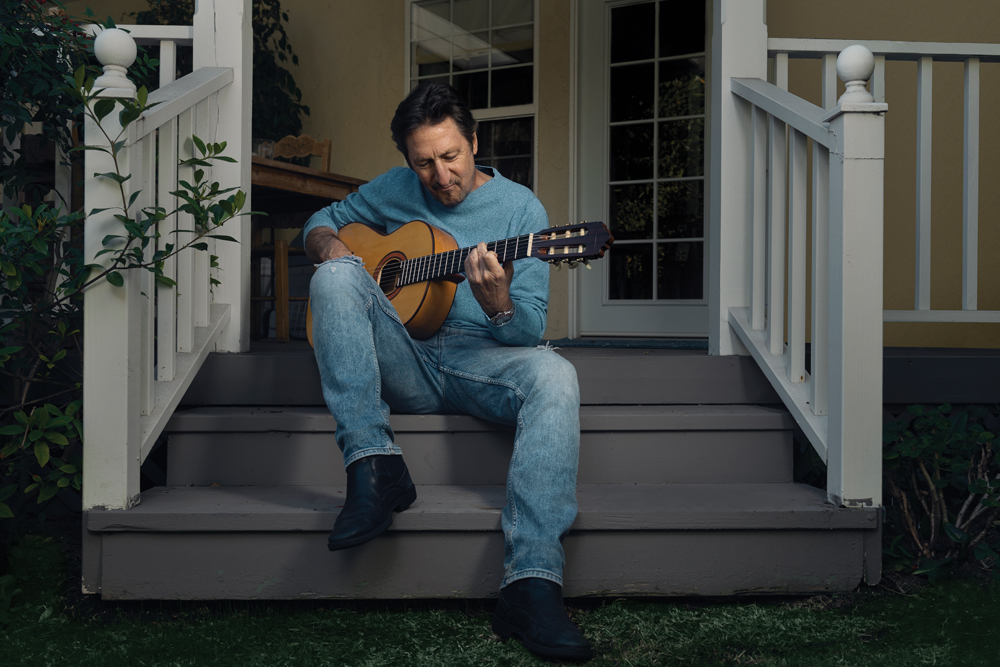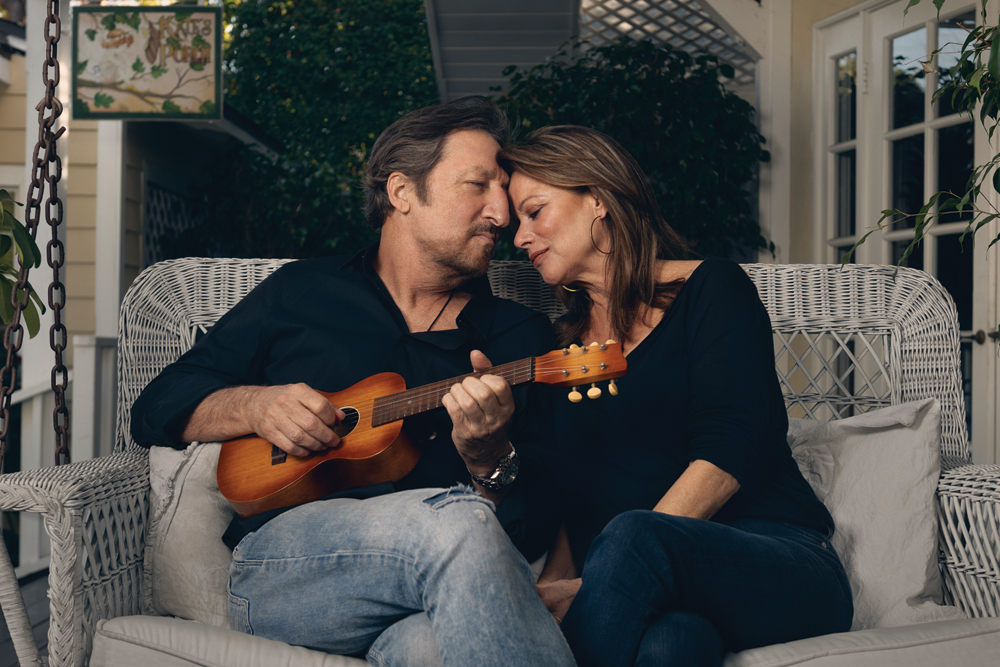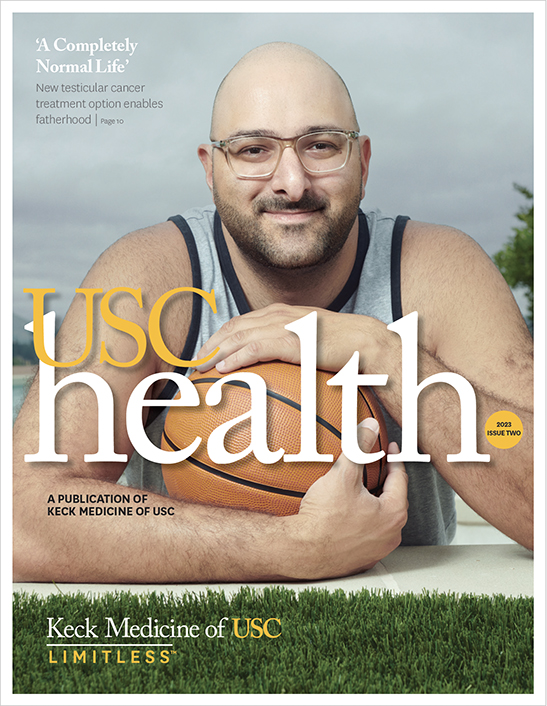
While Richard Smith was helping his sister move back to their hometown in Oregon, he felt a twinge in his neck. When he returned to Los Angeles, the discomfort became a lump.
Richard is a University of Southern California music professor and former chair of Studio/Jazz Guitar at the USC Thornton School of Music. His Trojan connections include getting his care at Keck Medicine of USC.
He made an appointment with his primary care doctor, who immediately referred him to Uttam Sinha, MD, a specialist in head and neck cancer surgery for the USC Caruso Department of Otolaryngology – Head and Neck Surgery. With a PET CT scan and needle biopsy, Dr. Sinha confirmed a diagnosis of squamous cell carcinoma of the head and neck.
From his first appointment, Richard noticed that not only was Dr. Sinha an expert in treating this type of cancer, but also the entire team at Keck Medicine was at the top of their game.
“Dr. Sinha has put together this amazing group of people,” Richard says. “They were so great. I never felt spoken down to, and I always felt like I was in the room with people who were a team.”
Richard worked to prepare his body for surgery and treatment
Prior to his surgery, that team helped Richard give himself the best possible shot at a full recovery. His background as a musician and teacher means that he loves to practice — and they put him to work doing vocal exercises to make his throat stronger, along with physical and swallowing therapy.
He gained weight in order to prepare for the inevitable loss that comes with post-surgical chemotherapy and radiation therapy.
“There can be a lot of collateral damage with surgery and radiation, which can cause scar formation, which in turn can compromise quality of life in terms of the function of the muscles,” Dr. Sinha, who is an associate professor of otolaryngology – head and neck surgery at the Keck School of Medicine of USC, says.
“If the patient does therapy before and during treatment to combat this, there’s less scar formation, resulting in a better functional outcome.”
If the patient does therapy before and during treatment … there’s less scar formation, resulting in a better functional outcome.
Uttam Sinha, MD, otolaryngologist, USC Norris Comprehensive Cancer Center
While Richard was hard at work preparing himself for surgery, his fiancé, Nancy Lee Grahn, had been working, too — researching every angle of his diagnosis and making sure that everything Richard needed was taken care of.
“I reached out to anyone I could think of who had experience with this type of cancer,” she says. “I listened to their expertise and advice, and then weighed every option with Richard. In a situation this life-threatening, you can feel powerless, and information is power.”
Luckily, Keck Medicine is the home of USC Norris Comprehensive Cancer Center, where the approach to cancer treatment is multidisciplinary, which includes a weekly head and neck tumor board to discuss treatment approaches and how to address each patient’s care on an individual basis.
Radiation oncologist Adam Garsa, MD, joined Richard’s care team and was essential to making sure Richard had a better chance at a full recovery.
“One of the main reasons our patients have great outcomes is our team approach,” says Dr. Garsa, who is also an assistant professor of clinical radiation oncology at the Keck School.
“We work together to develop the optimal approach to treat the cancer and minimize the effects of treatment.”
In January 2020, Dr. Sinha performed a transoral robotic surgery procedure to remove the tumor, along with the lymph nodes in his neck that were affected by the cancer. The surgery was successful, but there was still a long road to recovery.

To fight the side effects of chemo, Richard joined a clinical trial
Medical oncologist Jorge Nieva, MD, was a big part of Richard’s care team and pointed him in the direction of a clinical trial that addresses the problem of treating and preventing the side effects of chemotherapy and radiation for patients with head and neck cancer.
“Patients with head and neck cancer often need the combination of chemotherapy and radiation given at the same time,” Dr. Nieva, who is an associate professor of clinical medicine at the Keck School, says.
“That’s because with surgery in many of the areas of the head and neck, it’s difficult or undesirable to remove too much tissue from an area because there are so many vital structures nearby. Chemotherapy and radiation helps to clean up any cancer cells that may be around after surgery.”
The trial involved a class of drugs that help make the effects of the radiation even more pronounced on the tumor but protective of the normal tissue, and at this point, the as-yet-unpublished study is showing good results.
This is one of the benefits of being a patient at an academic medical center like Keck Medicine. Access to clinical trials can lead to better outcomes for patients who are undergoing cancer treatment.
But it was a time commitment of three hours a day, every day, for 45 days. And since much of this took place during the initial days of the COVID-19 lockdown, Nancy, who had been Richard’s advocate through all of the preparations and immediate recovery from surgery, could not be with him for those daily chemotherapy sessions.
“Before and after my surgery, Nancy was there 150%. She slept in the hospital and she bought everybody In-N-Out burgers. But when COVID really happened, it was very difficult without her there for my appointments. But the nursing staff became family,” Richard says.
“I would go in, as sort of a zombie, and they have to weigh you every day. I was down about 30 pounds, and sometimes I would leave my cell phone in my back pocket because I just didn’t want to see more weight loss,” Richard says.
“But the nurses never, ever lost their flow of positivity and kindness. They were just so incredibly cool.”
Richard is back to teaching with his hearing intact
Chemotherapy can cause loss of appetite, weight loss and changes in the ability to taste. Head and neck cancers can increase these side effects just by the nature of their location in the body.
This is where the preparations Richard made to strengthen his body before surgery really came into play.
“I had no sense of taste or smell, and there was a chance that only a small percentage of my taste would come back. And there was also a chance that I’d lose my hearing.”
As a music instructor, this would have been particularly devastating to him.
“But, it’s all coming back. I’ve got 99% of my taste back. I never lost any hearing, whatsoever. I lost 45 pounds, but it’s all coming back. It’s incredible, the recovery arc of every week your body coming back.”
I feel like grace is a huge part of my new life.
Richard Smith, patient, USC Norris Comprehensive Cancer Center
Nancy credits not only the staff and physicians of Keck Medicine, but Richard’s outlook for his recovery.
“First and foremost was his level of care at Keck Medicine. Dr. Sinha and Dr. Nieva and Dr. Garsa are at the top of their fields, and we were so lucky to be in their care. Their team was superb as well,” she says.
“Equally important was Richard’s good attitude and resolve to do what was necessary to save his life. He never once complained or resisted any of it. He allowed the process to happen with trust, courage and grace.”
Richard’s attitude is apparent when he talks about what getting back to teaching has been like for him.
“During my treatment, whether I would be able to teach again was a big part of my anxiety. I was thinking that if I couldn’t teach, it was going to be pretty bad,” Richard says.
“At first, I couldn’t talk before noon, because my voice was gravelly. But then I started getting my voice back, and doing the exercises, and it came back so quickly that I knew I could teach again.”
COVID-19 caused him additional worry. “Teaching music ensemble is like a team sport, and I thought that teaching online would be the end of the game. Instead, I love it. We’re developing new ways of teaching online — and just communicating — it’s a really incredible way to teach.”
Richard adds thoughtfully, “So that, I think, is a metaphor for so many things that I thought could go wrong, but have turned out to be right. I’m so full of gratefulness and I feel like grace is a huge part of my new life.”
Topics


